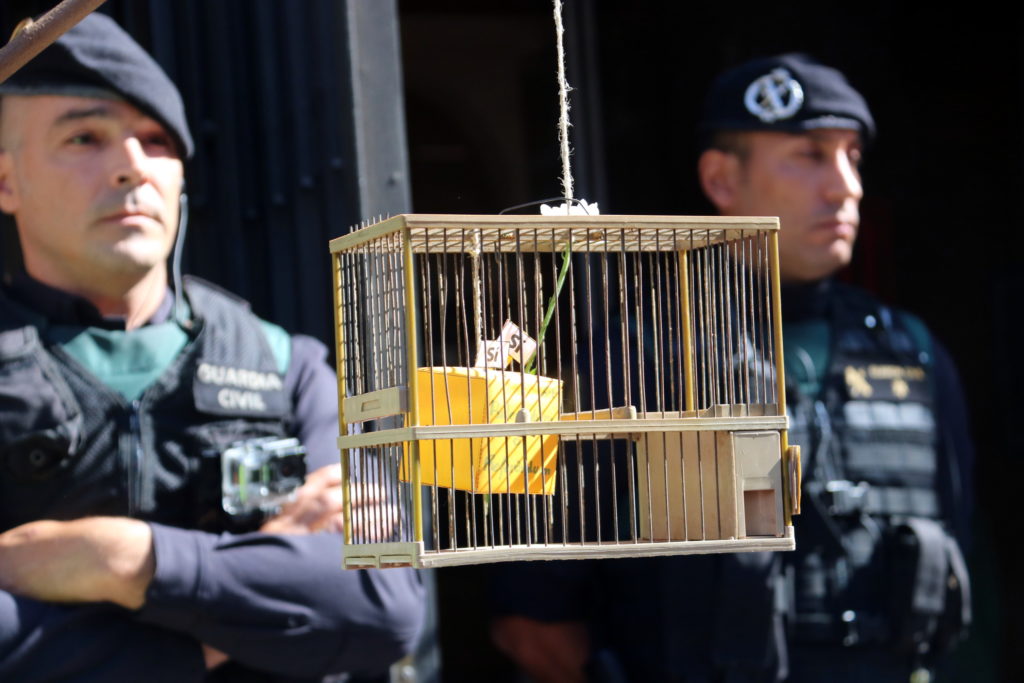20.09.2018 - 07:09
|
Actualització: 20.09.2018 - 09:09
With the October 1 referendum still over a week away, September 20 last year turned out to be one of the most crucial days for Catalonia’s push for independence: Spain launched the first major police operation aimed at disrupting the vote, and pro-independence supporters responded by taking to the streets en masse.
While the Spanish authorities would fail to prevent the vote, which was deemed illegal, the events on that September day led to the incarceration of several pro-independence leaders, including activists Jordi Sànchez and Jordi Cuixart.
At 8am, Guardia Civil police officers conducted the first raid, on the headquarters of the Catalan economy ministry in Barcelona. By the end of the day, Guardia Civil police had raided a total of 41 official buildings, and had arrested more than a dozen government officials.
The first to be arrested was Josep Maria Jové, the deputy of economy minister and vice president, Oriol Junqueras. However, as the day wore on more names would be added to the list, including officials from the tax department, the foreign office, and the IT and telecommunications center.
Rajoy: “The government is doing what it has to”
In Madrid, the then Spanish president, Mariano Rajoy, defended the operation aimed at stopping “an attempt to liquidate the Constitution and Spanish sovereignty.” “The government is doing what it has to,” said Rajoy, who asked Catalan president, Carles Puigdemont to take a “step backwards.”
Yet, the president was defiant and accused the Spanish government of “overstepping the red line that separates totalitarian regimes; it has become a democratic disgrace.” The then Parliament president, Carme Forcadell, added that the state had “definitively opened the door to repression.”
Spontaneous pro-independence protests
While Catalan politicians condemned the operation, thousands responded by gathering outside the raided buildings to voice their displeasure. Independence flags and symbols began appearing on the streets of Barcelona as protests sprang up around the city, and there was even a demonstration in Madrid’s central square of Puerta del Sol.
Involved in the protests were the grassroots civil organizations, Òmnium Cultural and the Catalan National Assembly (ANC). One of the most iconic images of the day were the heads of the organizations, Jordi Cuixart and Jordi Sànchez, standing on a damaged police car, calling on the protesters to disperse.
Civil leaders accused of sedition
Cuixart and Sànchez would later be arrested and charged with sedition, turning them into focal points for the pro-independence movement. On October 16, the two civil leaders would be sent to prison, where, despite the subsequent widespread campaign to have them released, they remain almost a year later awaiting trial.
Also charged with sedition would be the then Catalan police chief, Josep Lluís Trapero, who later stepped down from the post and who is still awaiting trial. The police chief and his Mossos d’Esquadra police were accused of deliberately not doing enough to prevent the public’s attempts to impede the raids.
Police seized a notebook belonging to Jové, where he allegedly noted the names of pro-independence leaders holding meetings to plot the independence bid. Judges prosecuting pro-independence leaders later used the notebook as evidence against Catalonia’s leading politicians.
Failure to stop the referendum
The September 20 police operation, with its widespread raids, arrests, blocking of bank accounts and websites, and the confiscation of documentation and electoral material was the first sign of how the Spanish authorities intended to approach the challenge posed by the independence movement and the determination to hold a referendum.
Despite the size of the operation, and other raids and arrests in the following days, the Spanish authorities would ultimately fail to stop the referendum on October 1. With polling places open and ballot boxes in place, Madrid sent riot police to break up the vote, and leaving over a thousand injured voters in their wake.


